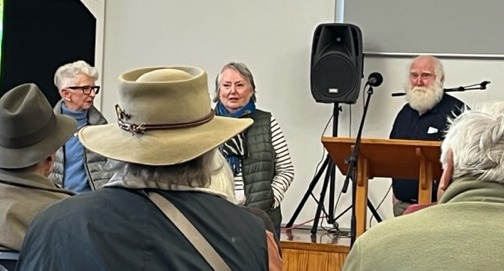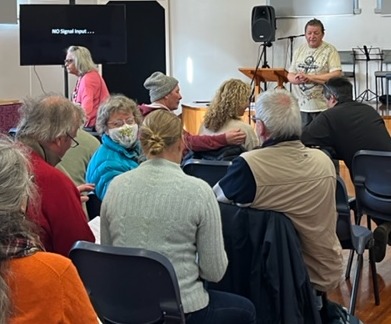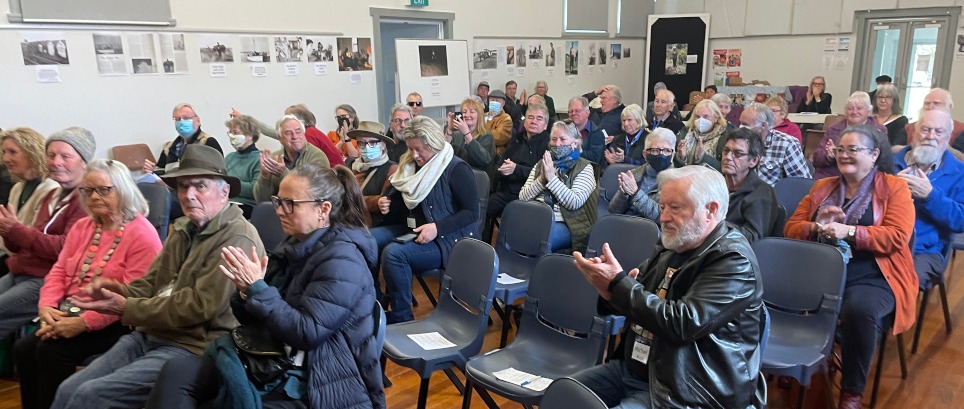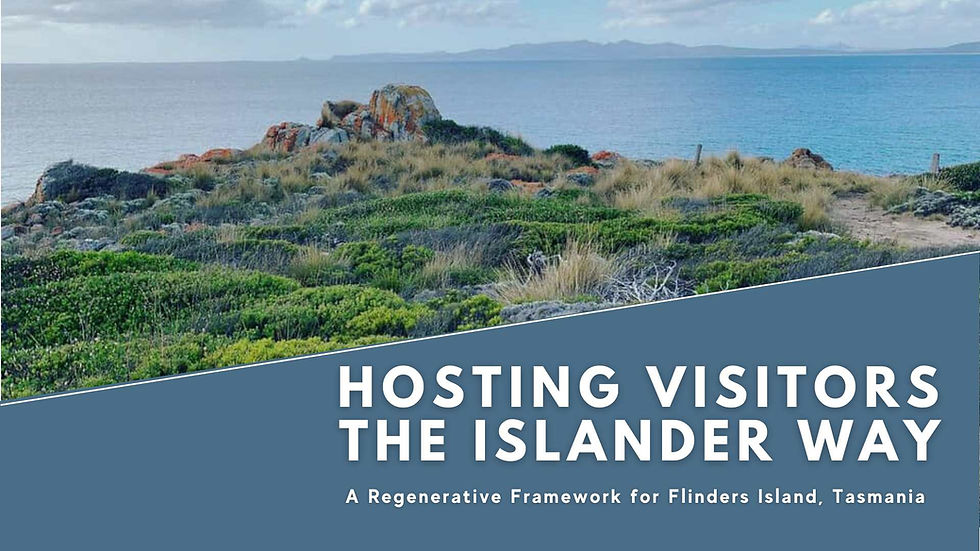Celebrating the islands’ rich maritime history
- Sarah Lebski

- Aug 31, 2022
- 4 min read
Sarah Lebski
The first ever Furneaux Maritime History Symposium was held at Lady Barron on Flinders Island from 12 – 14 August 2022. It attracted more than 60 participants who listened to 13 speakers over two days: a truly wonderful effort from organiser, Peter Rhodes and the Symposium committee!
As I walked into the Lady Barron Memorial Hall on this blustery and cool August weekend, I was drawn to the dozens of photographs around the walls; some black and white, some sepia and just a few in colour. These evocative images of sailing ships, mutton birding and a range of characters whose stories are irrevocably linked to the Island, came from the private collection of renowned Australian author, Patsy Adam-Smith.
Patsy’s deep connection with the Furneaux Group of islands was honoured throughout the Symposium. As well as her lived experience of sailing their waters for eight years, she also wrote two books; There was a Ship based on her time as a seafarer on the ‘Naracoopa’, and The Moonbird People which was about the Islands’ iconic mutton birds (moonbirds) and the people who depended on them for survival. Patsy’s son, Michael Adam-Smith was the guest of honour, returning to Flinders Island for the first time in more than 60 years.
I stopped to look at a page that had been scanned from Patsy Adam-Smith’s book, Australian Natural History Vol.2. It featured a painting of an Islander, Bill Riddle (Snr). Dressed in a red check shirt and balancing a spit laden with mutton birds, it had some text superimposed over the image:
Few of the older Straitsmen have not been down to the sea in ships. “It’s Island life,” Bill Riddle says. “If you’re a Straitsman, you’re a sailor, a fisherman, a shearer, a farmer, a birder, the lot, it’s life”. Not many of today’s or yesterday’s Straitsmen made money, but they did live a full life. Today, the descendants of families who have been on the islands for generations, still do all the things, all the trades, that Bill Riddle did as a boy.
This reflects a feature of island life that is still evident today. Despite internet access and frequent and reliable transport links, the islands’ communities remain innovative and resourceful. Later, I also learnt that the elderly man sitting in the front row at the Symposium was Bill Riddle’s son, who shares the name of both his father and grandfather. Strong intergenerational ties are another facet of island life.
I asked Peter Rhodes why he had chosen a ‘symposium’ – as opposed to a conference, or a seminar, for example. True to form, Peter provided a thoughtful response; he wanted the weekend to be more like a friendly discussion where the audience could interact with the speakers; just like the ancient Greeks from whom the practice originated.
The range of topics and presenters was one of the weekend’s many highlights. Keynote speaker, Dr Robyn Greaves recounted Patsy Adam-Smith’s early life and writing career; Dr Tom Gunn spoke of the convicts at Wyablenna; and Robyn Dilger’s reflected on her 25 years’ experience as a Marshall for The Three Peaks Race. The Bramble sisters’, Marguerite and Wendy shared their charming childhood recollections of an idyllic time on Flinders Island in the late 1950s and early 60s and a video interview with Master Mariner, the late Bill Barrett was another highlight. These are just a few examples. The Symposium encapsulated so many aspects of a world irrevocably shaped by the beautiful, yet often wild and perilous seas that surround the Furneaux islands.
I marvelled at the knowledge of those in the audience, none of whom were shy in offering additional information about various characters and events, and even the occasional correction! Bill Barrett’s son, Mick, himself a mariner, could seemingly identify a boat simply from a photograph of its bow. Following the video interview with his late father, Mick strode towards the lectern announcing that he’d ‘like to say a few words about my father’. As it turned out, Mick was a natural storyteller and his anecdotes were both interesting and amusing. These are a people with a profound sense of place.
The Symposium was interspersed with social activities, all of which typified the hard work and generosity of the local community. Visitors were given plenty of information regarding flights, accommodation, transport, road conditions and other ‘tips for first timers’. One of the newsletters sent prior to the Symposium noted – ‘if you come with too many expectations you may be disappointed…all you need to know is that we welcome visitors…’
The weekend was a fascinating, ‘deep dive’ into the islands’ rich maritime history. It is also part of a much bigger story. Islander, Peter Rhodes, whose love of Flinders Island is matched only by his encyclopaedic knowledge of its history, has a long-held dream – a purpose-built Maritime History Centre at Lady Barron. Currently, he and the Furneaux Maritime History Association have some of their collection housed in a small Council-owned building in the town, however a site has been selected and plans have been drawn up for an impressive, new space.
There is still much to be done to fulfil this ambitious and important venture. The Islander Way project is very pleased to be supporting Peter and the Association, through our Business Accelerator Program.













Comments